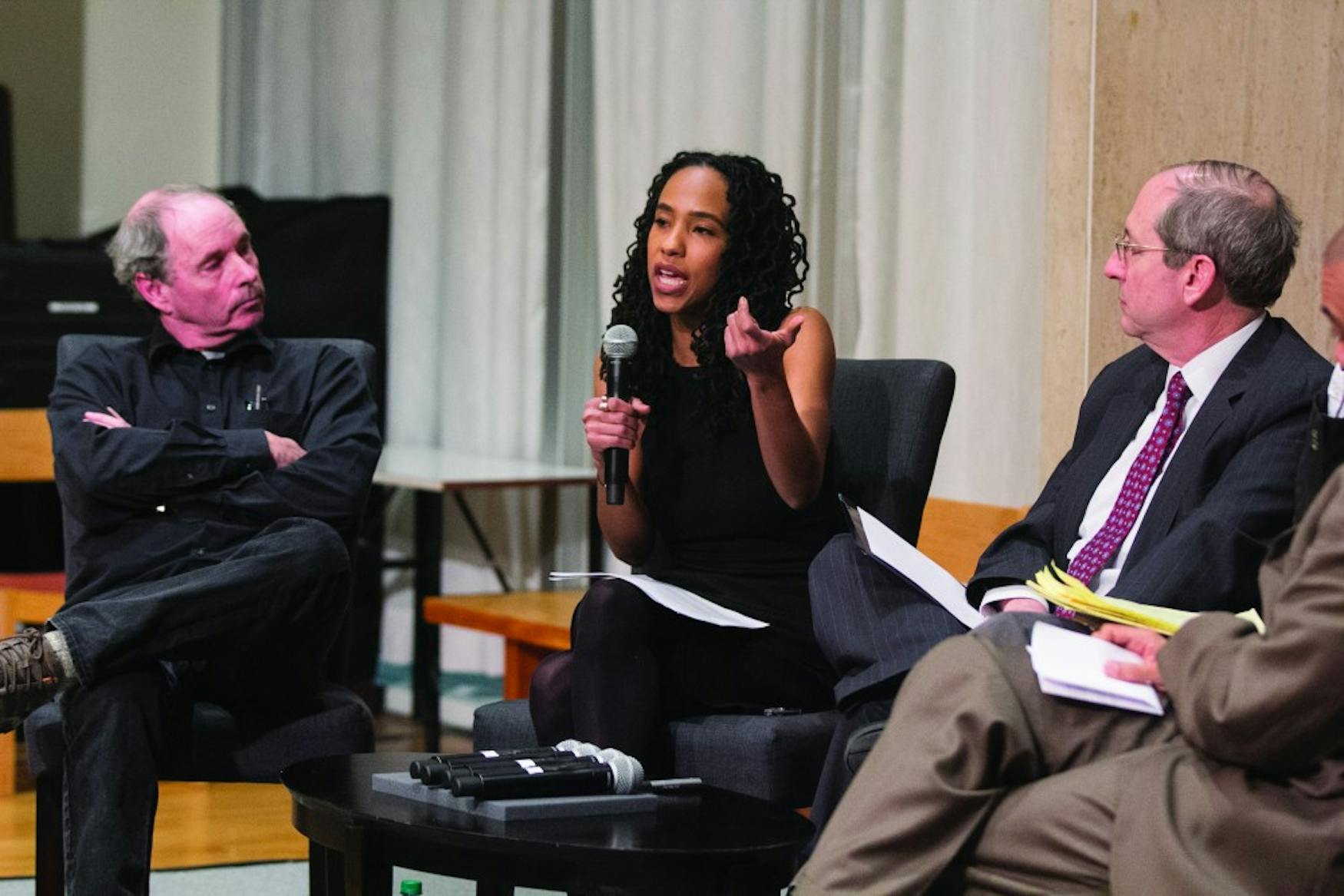Panel discusses 'Selma'’s portrayal of race and the Civil Rights movement
On Thursday night, Brandeis students and faculty members alike gathered in Rapaporte Treasure Hall to discuss and debate historical and thematical themes of the new film Selma and its portrayal of race relations and the Civil Rights Movement.
The discussion began with a panel, titled “Selma and Beyond: A Discussion on Race and Civil Rights,” which included Profs. Thomas Doherty (AMST), Jasmine Johnson (AAAS and WGWS), Daniel Kryder (POL) and Chad Williams (AAAS). University President Frederick Lawrence moderated the event.
The discussion followed Wednesday’s special on-campus screening of the historical drama, which chronicles an episode in the lives of Rev. Dr. Martin Luther King Jr. and other Civil Rights leaders as they navigated the 1965 voting rights marches in Selma, Alabama.
Doherty discussed the film’s portrayal of the Civil Rights era while simultaneously drawing upon the film To Kill a Mockingbird (1962) to describe the saturation of racism and the Civil Rights movement in film.
“What Selma does exceptionally well is to bring Americans back to a day … when brutal, up-front, no-holds barred racism in act, language and law was normative in America, when even people as decent as Atticus Finch would not dream of sitting next to a black person,” Doherty said.
Johnson spoke about how the film gives insight into “the ways that black women’s bodies and work matters [in the Civil Rights movement],” especially in more intimate settings, also noting director Ava DuVernay’s use of creative license when it comes to female characters.
“[The audience] gets an ordinary type of black womanhood [in the film] that I think is not inventive, and that we need to see on screen,” Johnson said.
Johnson also discussed what she called the “intersection of margins” that is black feminism, drawing on examples from the film and recent events to discuss women’s role in the ongoing equal rights movement.
“There’s a way black women get evacuated from movement labor, and the hashtags that we all repeat are authored by black women,” she said. “We need to recognize that and honor that.”
Kryder touched upon King’s strengths as a “theorist and practitioner,” also noting King’s strategy in drawing national attention to Civil Rights events.
“[Police] brutality is a sign of weakness. … King knows it, and that’s why he seeks it,” Kryder said. “What Selma shows us is a moment in time where organization was an advantage of the disempowered.”
Williams also noted that the movie does what “historians have not been fully capable of doing” in portraying the events in Selma.
“Selma is doing absolutely essential historical work. … The work that this film does matters,” Williams said, echoing his speech at the 10th Annual Rev. Dr. Martin Luther King Jr. Memorial last Monday. “Selma is here; Selma is right now; Selma is in this room.”
When asked during the question-and-answer session what he thought the film’s message meant to Brandeis students, Lawrence said he believed that it urges students to continue fighting to better their surroundings.
“Brandeis is ... what you make it … that’s the power of the film, the power of the message, and the empowerment for you,” he said. “You have a challenge to leave [the University] better than you found it.”
During the question-and-answer session Williams touched on the film’s portrayal of the black community.
Selma “does the work of reminding us that black people are beautiful,” he said. “It’s a confirmation of black humanity and that matters today in very real and very urgent ways.”
Williams also noted that the film’s significance derives from its ability to make the audience question their surroundings.
“[Selma] reminds us of black pain, what it means to have violence inflicted on black bodies and the type of trauma that has not just for the individual who is receiving the pain, but for the community,” Williams said. “And the eerie thing about that … is that we need to ask ourselves: ‘to what extent are black lives valued more today than they were in 1965?’ We can’t dismiss that.”
The Department of African and Afro-American Studies (AAAS), the Office of the President and the Louis D. Brandeis Legacy Fund for Social Justice sponsored the event.



Please note All comments are eligible for publication in The Justice.